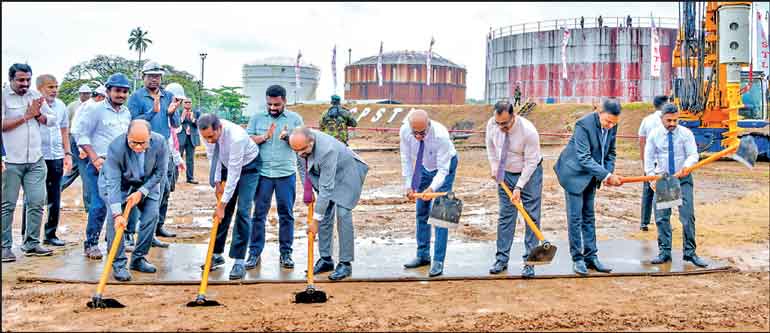Sunday Feb 22, 2026
Sunday Feb 22, 2026
Friday, 19 September 2025 00:26 - - {{hitsCtrl.values.hits}}

President Anura Kumara Disanayake on Wednesday inaugurated the construction of six new oil storage tanks at the Kolonnawa Petroleum Storage Complex.
The Rs. 3.7 billion project, awarded to an Indo East Engineering-Ceylex Engineering joint venture, will add three tanks of 15,000 cubic metres each – two of 7,000 cubic metres and one of 5,000 cubic metres – with completion targeted for September 2027.
“The Government has a responsibility to meet the energy needs of the people and we are committed to fulfilling that duty,” President Disanayake said, calling for public support in what he described as a “progressive transformation” to secure energy sovereignty.
The President warned that attempts by trade unions to obstruct the Government’s program would not be tolerated.
“If any trade union obstructs the program being implemented by the Government, we will not hesitate to take the necessary decisions,” he asserted.
“No institution can move forward with outdated traditions alone, nor can it progress through human labour alone. To move forward, technology and science must be integrated,” he added, stressing the need to modernise institutions
Disanayake also drew attention to the challenges faced by the energy sector reforms, especially the Ceylon Electricity Board (CEB), which has 26,000 employees under a single authority.
“When problems arise, it becomes difficult to identify the root cause. The law to privatise the CEB was passed before this Government took office. Is it a crime to amend that law?” he asked, pointing to ongoing union-led work-to-rule campaigns and warning that employees would need to make choices in the coming months.
Reaffirming his Government’s break from past political interference in trade unions and public institutions, Disanayake recalled that no public servants had been harassed under his administration. “Do the people of this country really want a return to that destructive past? If so, they would not have voted for us. They would not have chosen change, nor given us 159 seats in Parliament,” he declared.
The President also detailed efforts to cut electricity costs, noting that projects previously inflated by political interference had now been streamlined.
“A wind power plant in the North was earlier allocated at $ 0.08 per unit. We allocated the same land to another company that now produces electricity at $ 0.04 per unit, cutting the cost by 50%,” he said.
He said the work has also commenced on a 100 MW solar power plant in Siyambalanduwa, the country’s first of such scale.
Disanayake also revisited the stalled conversion of the Kerawalapitiya power plant to Liquefied Natural Gas (LNG), which experts had recommended as a cost-saving measure.
“Because of a conflict between the President and Prime Minister during the 2015-2019 Government, this conversion never took place. Consumers are still paying higher bills as a result,” he charged.
On oil exploration, the President contrasted past election-season gimmicks with his Government’s approach. “Our people often hear stories about oil exploration during election seasons. The first bottle of crude oil was shown during the 1970 election. At present, we place our trust in professionals and entrust them with the responsibility, while the Government only provides the necessary facilities,” he said.
The President also signalled wider reforms in the public sector. He announced that 33 non-performing State institutions would be closed, and questioned the utility of institutions that “lease their land and use the income to pay employees’ salaries.”
Highlighting progress at the Ceylon Petroleum Corporation (CPC), Disanayake revealed that the enterprise earned Rs. 18.2 billion in profit over the past eight months of 2025. While these profits cannot be distributed directly to consumers, Disanayake said the Government is channelling them “indirectly for the benefit of the public through education and health initiatives.”
The President also pledged to end the misuse of State resources, pointing out that some politicians and former Presidents had occupied Government residences for decades. “We are changing this culture. We are working to make the country more civilised and have ended the era of deifying rulers,” he said.
He insisted that his administration would not silence experts or scholars, adding: “Remaining silent is a disservice. By listening to them, we can advance the journey of building this country.”